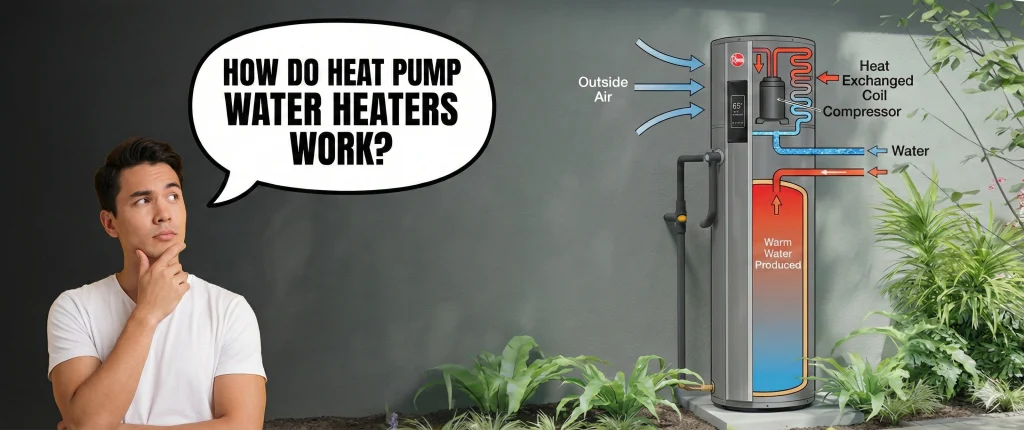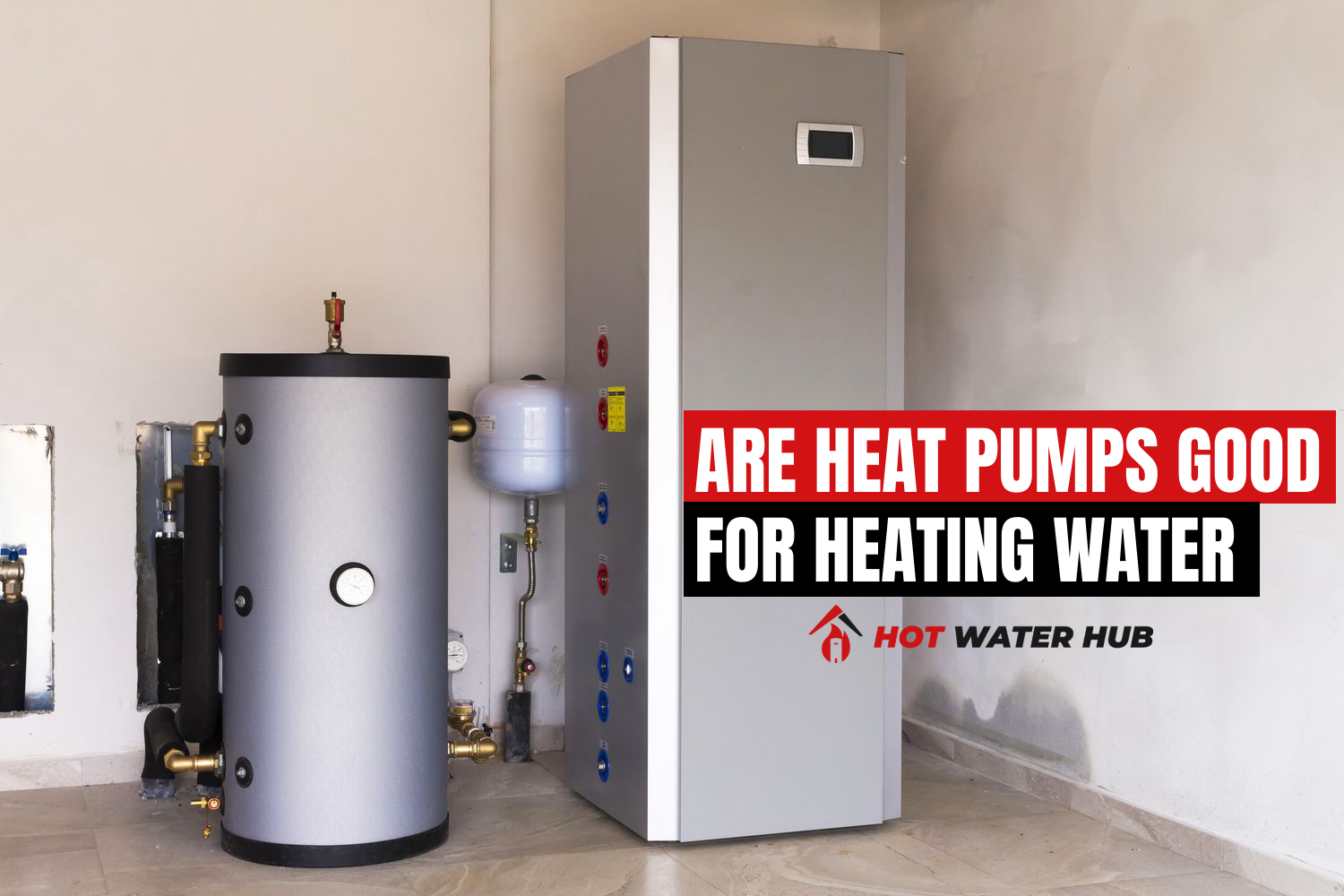
Ever wondered how you can heat your water using the air around you? It might sound like magic, but it’s […]

With rising electricity prices and concerns over sustainability, many Australians are considering heat pumps as a more efficient solution for water heating.
Heat pumps use electricity to extract heat from the air or ground and “pump” it into water, potentially providing a cost-effective and energy-efficient solution. But are heat pumps truly the best choice for heating water in Australian homes and businesses?
This article examines the pros and cons.
Heat pump water heaters work according to a simple principle – they use moderate electricity to extract, concentrate, and transfer heat energy into water.
This allows them to provide a higher water heating output than the electrical energy input.
Inside the heat pump is a refrigerant that absorbs ambient heat and evaporates into a gas, releasing the heat to the water and condensing it into a liquid to repeat the cycle.
There are two main types of heat pump water heaters:
Air Source Models:
Extract ambient heat from the surrounding air. They require ventilation and are typically installed outdoors.
Geothermal Models:
Extract heat from the ground via underground loops, and can be installed indoors.
Several key advantages make heat pump water heating an appealing choice in Australia:
However, heat pumps also come with some downsides that must be factored in:
Some key considerations to take into account when deciding if a heat pump is the most suitable water heating method for your home or business in Australia are:
It’s possible to use a heat pump for water heating in your shower.
However, it depends on whether the heat pump is made for this purpose and has enough power to fulfil your hot water needs. A heat pump water heater (HPWH) is a special kind of heat pump.
It works by taking heat from the air around it and transferring this heat to a water tank to warm up the water.
The HPWH might work alone or alongside a regular water heater. It can provide hot water for showers, baths, sinks, dishwashers, washing machines, or other appliances needing hot water.
The way heat pump hot water systems work might save you more money than traditional electric or gas systems, but it all depends. What are the main issues to consider?
How much does electricity cost, and what is your heat pump’s efficiency?
It’s all about the COP – the coefficient of performance. Good COP?
Your pump will convert electricity to heat with high efficiency. High COPs mean less power is needed to produce the same amount of heat.
The typical HPWH (heat pump water heater) has a COP of 3, meaning it churns out three heat units for each power unit it uses. This is top-notch when you compare it to the measly 1 COP of an electric heater and a lower 0.8 for a gas heater.
A heat pump’s COP fluctuates based on the temperature, humidity, and airflow. If it’s colder, the heat pump works harder to get heat from the air, lowering the COP.
For this reason, heat pump water systems work best in warm, humid climates and are more efficient there. In cold, dry climates, it might need a second heating element or an extra heater to keep the water warm, which can increase running costs.
What determines the operating cost of a heat pump hot water system? It’s the water tank’s size and insulation for one.
Simply put, bigger, well-insulated tanks translate into less heat loss. Consequently, the heat pump needs to work less often. But there’s a catch: larger tanks will bump up the initial cost and need more installation space.
Thus, picking a tank that fits your hot water consumption needs is key.
Heat pump water heaters might make some sound, as they have a fan and a compressor that create some noise while working, which can reach around 45 to 65 decibels (db).
It changes based on the model and where it’s installed.
For you to understand better, the sound of normal talking is around 60 db. A fridge? It’s 40 db.
But you can lower the noise a heat pump water heater makes by buying a model that’s quiet, installing it in an airy, well-insulated space, and not placing it near rooms where you spend most of your time.
How quickly a heat pump heats water depends on several factors.
These include the size and temperature of the water tank, and the air temperature and moisture levels. The heat pump’s COP also factors in.
Commonly, a heat pump water heater can warm up a 50-gallon tank from 50°F to 120°F in around 2 to 3 hours. This estimate varies according to conditions, but it doesn’t mean that you will be waiting this long for your hot water.
Most heat pump water heaters possess a special valve that mingles a bit of cold water with the hot.
This way, it keeps a steady temperature, and you can enjoy your hot water sooner and have more of it over time.
Your heat pump water heater’s electricity use hinges on several variables. These include the system’s COP, the water tank size and temperature, and your personal hot water habits.
Generally, a heat pump water heater with a COP of 3 might need about 1 kWh of electricity to warm up 15 gallons of 50°F water to 120°F. Consequently, using 45 gallons of hot water daily equates to roughly 3 kWh of electricity use.
That’s around 90 kWh each month, far less than a traditional electric water heater that guzzles about 15 kWh daily or 450 kWh monthly for the same water quantity.
Indeed, you can set up a heat pump system inside, but only if enough room and venting exist.
The pump requires warmth and a place to release cool air. That’s why it’s best in places like your basement, garage, or utility room.
These spaces should be large, think 1,000 cubic feet for every 12,000 BTU of pump power. The pump also needs to be linked to a duct system or fan. This will push cold air outside or to places that prefer cool, like your pantry or wine cellar.
Heat pump water heater prices vary based on type, size, model, and setup needs.
Standalone ones are generally $1,000 to $3,000. Integrated ones are typically $2,000 to $4,000. Installations? Usually, $500 to $1,500, depending on job size and location.
So, overall, you could pay about $1,500 to $5,500. A lot more than for simple electric or gas heaters that usually go for $500 to $1,500.
Though a heat pump water heater might hit your wallet hard at first, its cost balances out over time. You save big time on your energy bills – as much as 60% compared to standard electric heaters and 30% compared to gas heaters.
Count on it living a long life too, lasting up to 15 years.
Standard heaters?
They only make it to 10 years. Plus, your local utility company may offer a nice bonus, rebates, incentives, or even tax credits for installing a heat pump water heater. Check it out!
Unlike a gas heater, a heat pump water heater doesn’t generate harmful gases, so you don’t need a special vent, but it does require good ventilation.
The ideal location would be somewhere with plenty of warm air for the heater to extract heat from. It should also have enough space around to emit the cooler air it produces.
One solution is to connect your heat pump to a duct system or an exhaust fan. This way, the cool air can go outside, or it can chill down another area that needs cooling.
Heat pumps can offer a practical, energy-efficient water heating solution for many Australian homes and businesses.
However, their higher purchase costs, potential noise pollution, reliance on ambient temperatures, and increased maintenance requirements also warrant careful evaluation.
Examining your location, hot water usage, budget, and eligibility for renewable energy incentives can help you determine whether installing a heat pump water heater makes environmental and economic sense for your specific needs.
With thorough assessment and planning, heat pump systems can provide attractive savings and sustainability benefits.